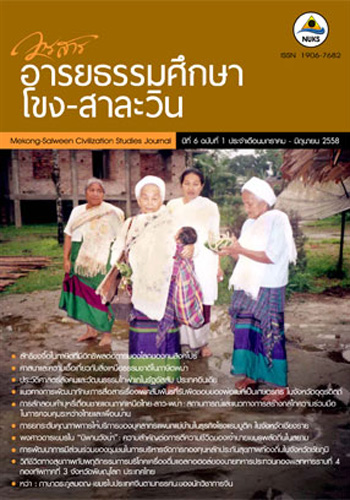ลัทธิขงจื๊อในภาษิตที่มีอิทธิพลต่อการมองโลกของคนสิงคโปร์
Main Article Content
บทคัดย่อ
ประเทศสิงคโปร์มีลักษณะโครงสร้างทางสังคมแบบรวมหลายเชื้อชาติ หลายวัฒนธรรม (Multi-ethnic and Multi-cultural Society) พูดหลายภาษาและนับถือหลายศาสนา โดยมีคนเชื้อสายจีนร้อยละ 74.2 มาเลย์ร้อยละ 13.4 อินเดียร้อยละ 9.2 และเชื้อสายอื่นๆ มีผู้นับถือศาสนาพุทธ ร้อยละ 33 ศาสนาคริสต์ ร้อยละ 18 ศาสนาอิสลามร้อยละ 15 ลัทธิเต๋าร้อยละ11 ฮินดูร้อยละ 5.1 ไม่มีศาสนาร้อยละ 17 และอื่นๆอีกเกือบร้อยละ 1 มีผู้ใช้ภาษาจีนร้อยละ 49.9 อังกฤษร้อยละ 32.3 มาเลย์ร้อยละ 12.2 และทมิฬร้อยละ 3.3 สิงคโปร์มีภาษาประจำชาติ 4 ภาษาคือ ภาษาอังกฤษ มาเลย์ จีน (แมนดาริน) และทมิฬ
จากการศึกษาภาษิตที่รวบรวมได้ สามารถจัดแยกตามที่มาและจำนวนที่พบสูงสุด 10 อันดับแรกดังนี้ ภาษิตจีน 97 สำนวน ขงจื๊อ 50 สำนวน หนังสือสุภาษิต (The Book of Proverbs) 31 สำนวน พระคัมภีร์สิกข์ 26 สำนวน ปัญจตันตระ 26 สำนวน ภาษิตเปอร์เซีย 15 สำนวน ภาษิตพุทธ 13 สำนวน ออเรลิอุส มาร์คุส (Marcus Aurelius) 12 สำนวน คำคมของลามะแห่งทิเบต (The Elegant Saying of the Lamas of Thibet) 11 สำนวน และ อีเมอร์สัน (Emerson) 9 สำนวน
ผลการวิจัยพบว่า โลกทัศน์วิถีชีวิตของคนสิงคโปร์จากภาษิต ส่วนใหญ่เป็นวิถีชีวิตวัฒนธรรมแบบชาวจีน หรือแบบขงจื๊อในรูปแบบปรัชญาและหลักศีลธรรม ซึ่งได้รับอิทธิพลมาจากพระพุทธศาสนา การศึกษาเรื่องโลกทัศน์เกี่ยวกับมนุษย์ของคนสิงคโปร์จากภาษิต ในด้านคุณธรรม ความซื่อสัตย์ ความเพียร ความสัมพันธ์ระหว่างเพื่อนมนุษย์ พบว่ามีความสัมพันธ์อย่างมีนัยสำคัญกับหลักคำสอนขงจื๊อ อาจกล่าวอย่างกว้างๆได้ว่าขงจื๊อมีจุดมุ่งหมายสำคัญในการสอนสองประการคือ ต้องการยกระดับจิตใจของคน และสร้างความสามัคคีในสังคม การที่จะบรรลุจุดหมายทั้งสอง ต้องเริ่มที่ตนเองก่อน ขั้นแรกต้องศึกษาเล่าเรียนเพื่อขัดเกลาจิตใจของตน ในขั้นต่อมาจะต้องใช้คุณธรรมเป็นหลักประจำใจเมื่อต้องติดต่อสัมพันธ์กับผู้อื่น หัวข้อสำคัญของคำสอนขงจื๊อ ได้แก่หลักการปกครอง ขงจื๊อมุ่งสอนชนชั้นปกครอง เพราะเชื่อว่า ถ้านักปกครองทำหน้าที่ของตนโดยใช้หลักจริยธรรม และวางตัวเป็นแบบอย่างที่ดีแก่ราษฏรแล้ว บ้านเมืองก็จะสงบสุข ส่วนราษฏรก็ต้องเชื่อฟังผู้ปกครอง เป็นหลักปฏิบัติที่ต่างฝ่ายต่างมีพันธะต่อกัน แนวทางความคิดขงจื๊อเชื่อว่า วิถีชีวิต และการปกครองที่อยู่ในระบบจารีต และคุณธรรมเป็นมรรควิธี ความกลมกลืนของสังคมจะเกิดขึ้นได้หากผู้คนในสังคมปฏิบัติจารีต และคุณธรรมตามนามคู่สัมพันธ์ทั้งห้า (ผู้ปกครอง-ผู้ใต้ปกครอง พ่อแม่-บุตร พี่-น้อง สามี-ภรรยา เพื่อน-เพื่อน) ซึ่งสอดคล้องกับข้อคิดเตือนใจที่พบในสุภาษิตสะท้อนโลกทัศน์ที่เกี่ยวข้องกับมนุษย์ของคนสิงคโปร์ ในด้านคุณธรรม ความซื่อสัตย์ ความเพียร ความสัมพันธ์ระหว่างเพื่อนมนุษย์
อย่างไรก็ตามเมื่อดูวิธีการรวบรวมภาษิตทั้งหมด ผู้วิจัยพบว่าสิงคโปร์มุ่งนำคำสอน คติเตือนใจที่มีที่มาอย่างหลากหลาย เช่นนักคิดนักเขียนทั้งฝ่ายตะวันตกและฝ่ายตะวันออก ซึ่งสะท้อนให้เห็นถึงเจตนารมณ์สำคัญของคนสิงคโปร์คือสร้างความปรองดองให้เกิดขึ้นระหว่างประชากรสี่เชื้อสายวัฒนธรรมสำคัญที่กล่าวมาแล้วนั่นเอง
Doctrines of Confucius in Proverbs Influence Singaporeans’ Perspectives of the World
The social structure of Singapore is multi-ethnic and Multi-Cultural Society. Singaporeans speak many languages and various religions can be found on this island. The Singaporean society is built up of many races and ethnical background namely: 74.2 percent Chinese, 13.4 percent Malay, 9.2 percent Indian and 3.2 percent Others. As for the religion, 33 percent are Buddhists, 18 percent are Christians, 15 percent are Muslims, 11 percent are Taoists, 5.1 percent are Hindus, 17 percent are free-thinkers and almost one percent are others. Singapore has four national languages: English, Malay, Chinese (Mandarin) and Tamil; 49.9 percent of the population use Chinese, 32.3 percent use English, 12.2 percent use Malay and 3.3 use Tamil.
The 588 proverbs can be classified by the source and the top ten sources are as follows: 97 Chinese idioms, 50 Confucius idioms, 31 idioms from “The Book of Proverbs”, 26 idioms from Sikh Scriptures, 26 idioms from “The Panchatantra”, 15 Persian idioms, 13 Buddhist idioms, 12 idioms from Marcus Aurelius, 11 idioms from “The Elegant Saying of the Lamas of Tibet” and 9 Emerson idioms. The results showed that the worldviews of Singaporeans through proverbs mostly consist of the Chinese way of life and the philosophy and morality from Confucius, which are influenced by Buddhism. The study of the worldview of Singaporeans through proverbs in the areas of human relationships, justice, honesty, tenacity has revealed a strong correlation with the teachings from Confucius. The Confucius religion focuses greatly on human with the idea that states: Human may cause great prosperity or downfall, thus, humans influences everything in the world. Thus, human is deemed as the centre of the world. Due to this reason, there is a great need to great people, who will bring good to the lives of others and the world. In order to become a good person, one must processes morality and ethics. To conclude, the Confucius religion teaches everyone to be a good person, which coincides with the proverbs influence Singaporeans’ perspectives of the world in the areas of justice, honesty, tenacity and human relationship. However, according to how proverbs are collected, we found that Singapore has tried to use proverbs from different sources: quotations of some writers and philosophers both from the West and the East. That’s reflect the important purpose: create a harmonization of the four ethnic groups as mentioned the above.


